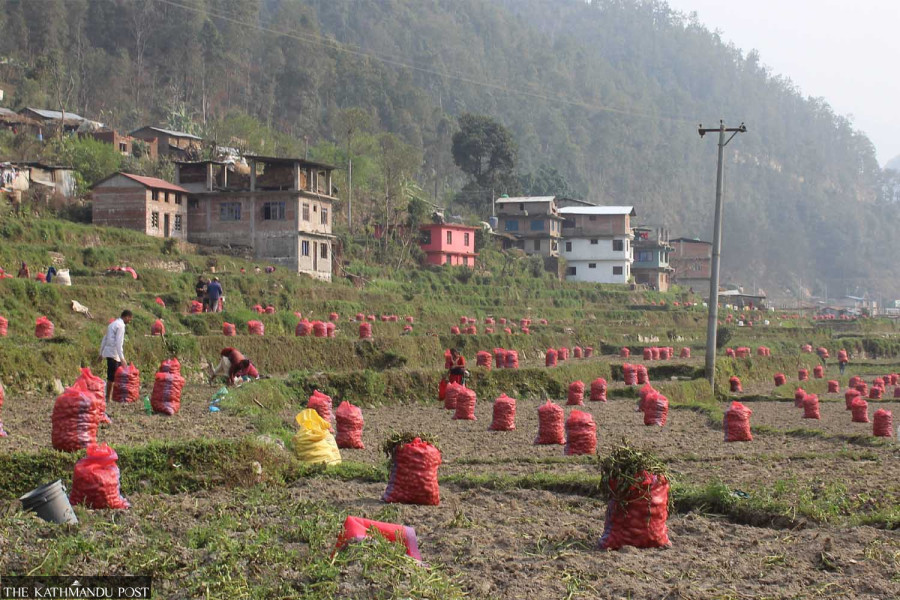Money
Vegetable prices soar above Rs100 per kg
In retail, tomato costs Rs200, cauliflower Rs200 and French beans Rs270 per kg.
Post Report
Prices of almost all vegetables have shot up in the past week, burning a hole in many households' budgets amid festivities.
Most green vegetables sell above Rs100 per kg; some have even crossed the Rs200 per kg mark.
Cauliflower, cowpea, green bean, bitter gourd, bottle gourd, potato, onion, chayote, pointed gourd, tomato, cabbage, eggplant, and okra now cost above Rs100 per kg.
Nearly four weeks since the heavy rainfall at the end of September devastated the country, battered crops and severed supply lines, vegetable vendors still blame the price surge on the production and supply disruption.
“It is becoming difficult to manage household expenses. The prices are rising and rising,” said Nabina Sunuwar, a homemaker.
“How can we afford cauliflower at Rs200 per kg and eggplant at Rs110 per kg?” she asked.
“We have a limited income source, and food prices rising every day is worrisome.”
Binay Shrestha, information officer at the Kalimati Fruits and Vegetable Market Development Board, said that the seasonal vegetable production, particularly the post-monsoon output, has declined so the market receives only smaller quantities.
“We hope the prices will cool down once the winter seasonal vegetables arrive.”
He blamed a mismatch between the output and supply for the rising prices.
The Kalimati market, the country’s largest vegetable wholesale platform, has been receiving 500 tonnes of vegetables daily for the past few weeks.
On Thursday, the market received 507 tonnes of vegetables. Normally, the Kalimati market handles 700-800 tonnes of vegetables daily.
However, the demand increases amid short supplies during the festivities, and prices go up, said Shrestha.
Of the 500 tonnes of vegetables that arrive at the Kalimati market, 40 percent are potatoes and onions. Green vegetables make up the rest.
Traders said that the prices might slowly cool after Tihar and Chhath festivals, with more consignments coming from farms.
Consumer rights activists said that leaving the vegetable market unchecked has caused the prices to reach uncontrollably high.
Vegetable prices have increased by more than 300 percent within a month, and this is not only because of the low output, said Prem Lal Maharjan, president of the National Consumer Forum. “The government is either unaware of the issue, or it is simply giving traders a free hand.”
“It is the government's responsibility to monitor the supply situation and push down prices during the festivals and a crisis.”
Changing weather patterns have significantly impacted vegetable production. A record high rainfall in Kathmandu and other parts of the country damaged crops, reduced yield and also affected the supply of vegetables from other districts. This has created a supply crunch, leading to the rise in prices.
The inflation in vegetables has increased, central bank’s data show.
According to Nepal Rastra Bank, the year-on-year consumer price inflation stood at 3.85 percent in mid-September, compared to 8.19 percent a year ago.
However, vegetable inflation increased by 9.84 percent in the review period.
The Kalimati Fruits and Vegetable Market Development Board's wholesale vegetable price index shows that the price of most vegetables, such as tomatoes, onions, carrots, cauliflower, and cowpeas, has crossed Rs100 per kg.
The wholesale price of tomatoes has crossed Rs125 per kg, while in retail, they sell for Rs200 to Rs210 per kg.
On Friday, potato wholesale price was Rs82.67 per kg at Kalimati, but in retail, it traded for Rs130 to Rs135 per kg.
The wholesale price of cauliflower has reached Rs130 per kg, a 73.33 percent jump in two months. The vegetables now cost Rs200 to Rs205 per kg.
The wholesale price of French beans (rajma) has skyrocketed by 40.74 percent to Rs190 per kg. In retail, it costs Rs270 per kg.




 13.12°C Kathmandu
13.12°C Kathmandu












